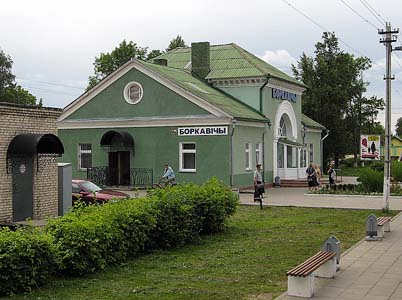TEVEL THE MILKMAN
or
WHO WILL WRITE THE HISTORY OF BORKOVICHI?
Borkovichi is an old trading place, conveniently located on the bank of the river Drissa and not far from the road Nevel – Disna. One can still find old coins on the square where trading fairs used to take place. The oldest of them date from 1663-1665.
In the 19th century the trading fairs in Borkovichi were popular not only locally. You can still hear about them from the locals’ children and grandchildren.
 Borkovichi. Railway station.
Borkovichi. Railway station.
The largest number of the tradesmen was Jewish. In fact, there was a Jewish street, where numerous shops were located. Today not a trace is left from the shops, and the street is called Sovetskaya Street.
Borkovichi still retains remnants of an old Jewish cemetery.
In 1925 Borkovichi had 2 churches, one of them made of stone. However, archives do not mention a synagogue or a Jewish prayer house.
I first heard about Borkovichi in the middle of the 90s from Zeev Abramson, who was a representative of “Joint” in Belarus. His great grandfather Tevel Dinkin had lived in Borkovichi.
According to Zeev’s story, his great grandfather was quite a colorful person. Before moving to Borkovichi, he lived in Poliesie with his family. He had cows and earned his living by selling milk. In the 80s, when the anti-Jewish campaign started, the Dinkins were forced to move out. Tevel came to Borkovichi in search of work. He heard that one of the local landlords was favorable to Jews and therefore many of them headed for Borkovichi. He gave Tevel some land not far from the railroad and he started building a house. Next to them other Jews were building their houses and that was how the street appeared.
Tevel, just like other Jews, rented a part of the forest from the landlord and hired peasants who felled timber, transported it to the railway station and sent them to Baltic towns. Tevel had a big family with eleven children – he needed to make sure that all his children would be fed and educated properly. Therefore, he had to work hard. He was a strong person and lived to be over a hundred year old.
Zeev Abramson enjoyed telling “Borkovichi” stories, which he had heard at home. His great grandfather used to adhere to Jewish traditions, but he was not a strictly religious person. None of his children or grandchildren attended a yeshiva.
Tevel liked having a drink. The family often remembered the day when he was coming back home quite drunk and fell out of a train. Just to prove how strong his health was – he was not hurt and the following day he went to work.
Usually stories about Borkovichi were sentimental and they idealized life in the town. Maybe due to the fact that the people who lived there were on close terms with each other. “A lot of our relatives lived in the town as well”, - says Zeev.
In the 20s the authorities started persecuting rich citizens, so Tevel’s children left Borkovichi. Some of them moved to Riga and Polotsk.
His unmarried daughter Sima stayed in Borkovichi. So did Gita Gurevich. Sima was a truly sociable person. Sima and Gita were both executed with other Botrkovichi Jews during the war. The execution was carried out by the head of Borkovichi military police Martin Filor and investigator Rudia Schneider.
We would like to find children and grandchildren of Borkovichi Jews. The history of the place can be written only from their stories.
Arkady Shulman
|

